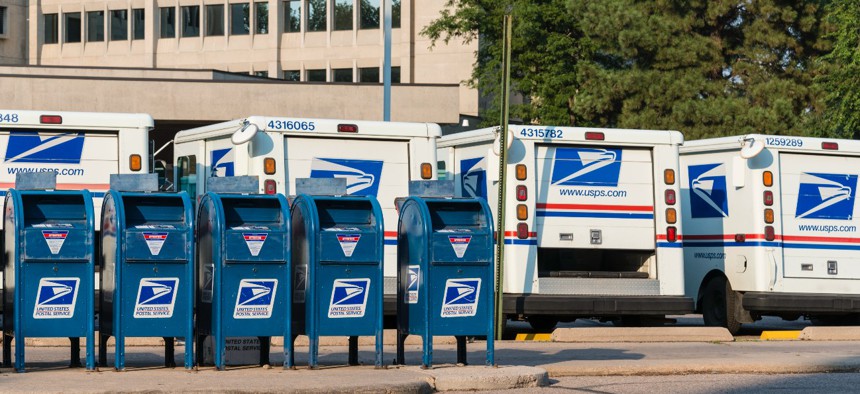
RiverNorthPhotography / iStock
Postal Service Asks Court to Toss Vehicle Fleet Lawsuit
Potential vendor says USPS' process was unfair, but mailing agency says company hasn't followed proper procedures.
The U.S. Postal Service is asking a federal court to dismiss a lawsuit against it claiming the agency arbitrarily awarded a potentially multi-billion dollar contract to replace its vehicle fleet, arguing the plaintiff has not followed the proper procedure.
In February, USPS awarded its fleet replacement contract to Oshkosh, tasking it with manufacturing at least 50,000 and up to 165,000 vehicles. Workhorse Group, a much smaller company and also a finalist for the contract, last month sued USPS over the decision. The Postal Service and the Justice Department subsequently asked the U.S. Court of Federal Claims to throw out the suit, saying Workhorse must first go through USPS' internal process to challenge procurement decisions before a court can weigh in.
“Workhorse has indisputably failed to exhaust administrative remedies required by applicable Postal Service regulations,” the government wrote. “As a result, the Court must dismiss this case.”
Justice and USPS said federal statute gives the Postal Service autonomy in making procurement decisions and USPS regulations require a two-step process when challenging a procurement decision. A potential vendor has 10 days after an award to file a grievance with the contracting officer. If still unresolved, the company can then lodge a second complaint with the supplier disagreement resolution official. USPS argued both steps are necessary before litigation can be pursued, and Workhorse completed only the first one before filing its lawsuit. The contracting officer denied Workhorse’s original complaint, but the company never proceeded to the second step.
Workhorse said in its complaint it spent six years and more than $6 million on its bid. It accused USPS of predetermining the outcome of its procurement without informing the bidders. The company said USPS "put its thumb on the scale" against its bid when it "falsely blamed" Workhorse for an incident that resulted in its prototype rolling into a ditch during a demonstration. Workhorse said the incident was clearly the result of driver error and not an indictment of its vehicle.
Workhorse argued Oshkosh's selection was surprising given how few electric vehicles the company plans to produce, the costs USPS will incur just to allow Oshkosh to complete its design and the significant differences between the selected model and the prototype Oshkosh actually put through testing.
“Even though ‘prototype performance’ was specifically identified as an evaluation subfactor, the USPS had selected a vehicle from Oshkosh that skipped the prototype phase altogether,” Workhorse said. “This was especially puzzling given that Oshkosh has never previously produced a last-mile delivery vehicle, much less an electric one.”
The contract will be worth at least $482 million as Oshkosh is set to custom build an initial order of 50,000 right-hand-drive vehicles for USPS. The Postal Service’s “next generation delivery vehicle” search has lasted several years and gone through multiple delays, though its aging fleet and reports of trucks catching fire have given the process urgency. USPS owns more than 200,000 vehicles, most of which are categorized as “long-life” and have been on the road for an average of 25 years.
The Postal Service in 2016 awarded contracts to six companies to build delivery vehicle prototypes. USPS delayed its selection after testing the models, but later narrowed the candidates to three finalists: Karsan and Morgan Olsen, a Turkish and American company that teamed up for its bid; Oshkosh, which initially partnered with Ford on its bid; and Workhorse, an electric vehicle startup. Oshkosh has a long history of working with the Defense Department to custom build vehicles for the military. While two years away from beginning manufacturing, the company said it has already planned some parts of its process.
Oshkosh itself filed a similar motion to dismiss the lawsuit on Monday.
NEXT STORY: How Agencies Can Maximize Year-End Spending







